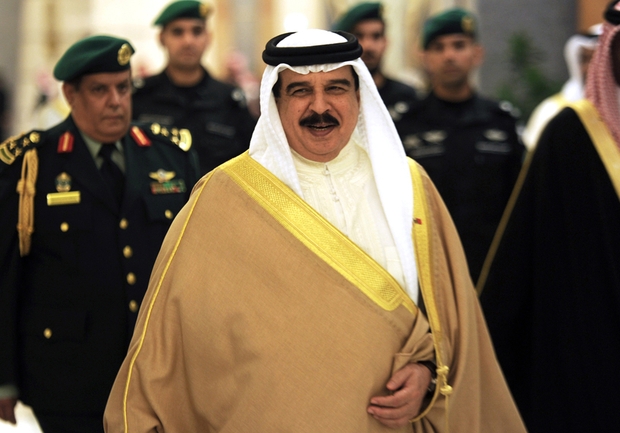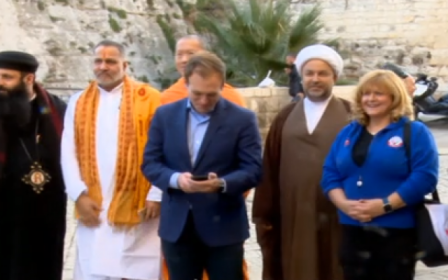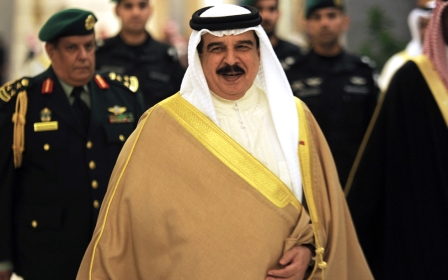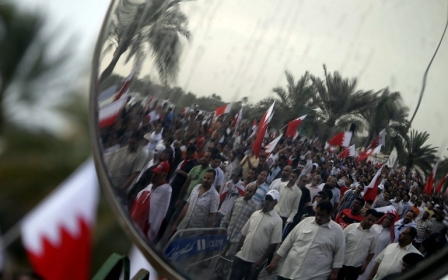Israel and Bahrain: A true meeting of minds

Ayoob Kara is the Israeli minister of communications. He is a Likud party member, a staunch pro-settlement advocate and a hawk who has advocated pre-emptive bombing strikes on Iran.
Though he is a Druze, some parts of the Israeli media have acclaimed him as"the most Zionist non-Jew in the world". Minister Kara also has a curious fascination for the tiny Gulf state of Bahrain.
The mysterious 'prince'
On 4 February, he tweeted a photo of himself and a young man he called "the prince of Bahrain". "I met publicly for the first time in Tel Aviv with Mubarak Al Khalifa, the prince of Bahrain, in order to strengthen the relationship between our two countries," he wrote, adding enthusiastically that he would have the honour of welcoming the young Al Khalifa to Israel's parliament, the Knesset the following day.
The Bahrain Federation of Expatriate Associations or BFEA founded with the blessing of King Hamad in June 2011 in the aftermath of a pro-democracy movement that was put down with brutal force by his security services
The only difficulty is that the "prince" doesn't show up on any Bahraini branch of the extended Al Khalifa family tree. To make matters more awkward, the Israeli foreign ministry had not been informed as is customary when foreign dignitaries make official visits, particularly true of one coming from an Arab country.
Nor had the Knesset been told. The Times of Israel in an article debunking the minister went so far as to suggest the prince's real name is Mubarak Hamad, a chap involved in a case of being drunk and disorderly on board a passenger jet in 2012.
The newspaper sardonically headlined the story "Minister claims mystery 'prince of Bahrain' is visiting Israel".
As the story broke Kara went to ground along with Mubarak Al Khalifa or Mubarak Hamad, take your pick. No Knesset welcome, no more gushing about the strengthening of relations.
It may be that the minister had let his guard down after welcoming a delegation from Bahrain in December of last year. That group, 24 strong, calling itself "This is Bahrain", has been on a global junket over the past four years carrying what it calls a message of peace and religious tolerance.
A bitter irony
"This is Bahrain" is the brainchild of the Bahrain Federation of Expatriate Associations or BFEA, founded with the blessing of King Hamad in June 2011 in the aftermath of a pro-democracy movement that was put down with brutal force by his security services.
For a full account of just how brutally the uprising was crushed, I urge you to read the Bahrain Independent Commission of Inquiry (BICI) report, commissioned by the king after a global outcry forced him to take action.
At the time, Bahrain's December visit was seen as a sign of a warming of relations with a Gulf state that does not recognise Israel. The king was reportedly asked if the delegation should visit a state considered an enemy of the Arab world. "Bahraini citizens can go anywhere they want around the world; there are no restrictions on the Bahraini citizens," he is said to have replied.
In a further bid to silence all dissent Bahraini oppositionists are being stripped of their citizenship. Since 2011, the Bahraini authorities have revoked the nationality of over 550 people, including at least 150 in 2017 alone
That will strike opponents of this authoritarian regime as a bitter irony. Thousands are locked up in the infamous Jaw prison outside the capital Manama. Many leading critics including the veteran human rights activist Nabeel Rajab and Sheik Ali Salman, the leader of the now-banned opposition society Al Wefaq, are in jail.
Others, though not in jail, are prohibited from travelling.
Silencing dissent
In a further bid to silence all dissent, Bahraini oppositionists are being stripped of their citizenship. Since 2011, the Bahraini authorities have revoked the nationality of over 550 people, including at least 150 in 2017 alone.
The government has now taken to expelling some of those who have lost their nationality. As Amnesty International notes: "Turning citizens into stateless people and banishing them by forcing them to leave the country is a violation of international law."
Presumably Minister Kara was blissfully unaware of - or unconcerned about - the unsavoury business of repressing citizens calling for peaceful change and making people stateless, at least insofar as it applied to Bahrain.
But assuredly he cannot be unaware of what his own government is doing to Palestinians. He is, after all, a passionate supporter of the illegal settlement movement in the West Bank of occupied Palestine.
And as the Bahrainis continue with their campaign of citizenship-stripping and deportation, the Israelis are caught up with their own campaign of driving people out. In their case it is African migrants.
At least there is a vigorous debate in the Israeli media about this. Holocaust survivors are aghast that their government should be carrying out mass arrests and expulsions. It is close, too close, to their own terrible experience at the hands of the Nazis.
There is no opportunity for such a debate in Bahrain. The last and only independent media source in the country and indeed the Gulf, Al Wasat, was shuttered by the government in July. So it is that at home the Bahraini regime's tight control of the media ensures there are no challenges to the rule of impunity while abroad it showcases an image of Bahrain that is riddled with cant and hypocrisy.
Under the convenient guise of religious diversity and tolerance, a true meeting of minds then: the apologists of Bahrain and a publicity-seeking Israeli cabinet minister who has contempt for the rights of Palestinians have, it would seem, a great deal in common.
- Bill Law is a Middle East analyst and a specialist in Gulf affairs. He tweets @billlaw49.
The views expressed in this article belong to the author and do not necessarily reflect the editorial policy of Middle East Eye.
Photo: King Hamad reportedly condemned the Arab boycott of Israel (AFP)
This article is available in French on Middle East Eye French edition.
Middle East Eye propose une couverture et une analyse indépendantes et incomparables du Moyen-Orient, de l’Afrique du Nord et d’autres régions du monde. Pour en savoir plus sur la reprise de ce contenu et les frais qui s’appliquent, veuillez remplir ce formulaire [en anglais]. Pour en savoir plus sur MEE, cliquez ici [en anglais].





